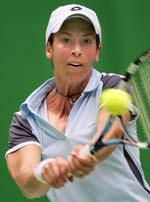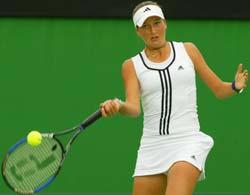Israel will always be associated with the darkest hour in sport after Palestine Liberation Organisation cadres massacred 11 of the country's athletes during the Munich Olympics in 1972.
But the Jewish country, adolescent to the concept of sport, is getting ready to write some happy stories.
 Tzipora Obziler, who almost knocked out India's teen tennis sensation Sania Mirza in the quarter-finals of the WTA Hyderabad Open on Thursday, and Shahar Peer, participating in the same event, introduced their tenacity and Israel's tennis capabilities to India this week.
Tzipora Obziler, who almost knocked out India's teen tennis sensation Sania Mirza in the quarter-finals of the WTA Hyderabad Open on Thursday, and Shahar Peer, participating in the same event, introduced their tenacity and Israel's tennis capabilities to India this week.
"Unlike what most people think, sport is given a lot of encouragement in Israel. The facilities and coaches there are world class," said the 17-year-old Peer, who jumped from 709 in the 2003 year-end rankings to 132 in 2004.
The Israel Tennis Centres that were founded in 1976 have grown into the country's most admired institution. There are 14, which comprise 11 ITC programmes and three centers offering programmes designed to promote social integration and education.
Almost 300,000 students have participated in the subsidized programmes, which charge according to one's financial capability.
"That's how I started. I went to the center in Tel Aviv with some of my friends and got interested in the sport. The centers are mainly run on government funding and private donations. At times the children can participate for free also," informed Obziler.
"There are not many public courts but with the centers spread right through the country we get professional training all the while," added Peer.
The ITC was awarded the Israel prize in 1989 for important development work with youth. The programmes also encourage immigrant children from the former Soviet countries and Ethiopia. The institution has shown amazing progress considering Israel started taking the sport seriously only after World War II.
 Historically, sport and Judaism didn't mix. The repulsion for sport was sown in the third century when the Greeks ruled the territory. Sport was seen as a Greek concept and the Jews boycotted the Olympics.
Historically, sport and Judaism didn't mix. The repulsion for sport was sown in the third century when the Greeks ruled the territory. Sport was seen as a Greek concept and the Jews boycotted the Olympics.
During the Roman period, sport in the country was associated with cruelty, violence and gladiatorial combat. It was seen as "Hellenistic" evil. The orthodox Jews still follow the policy.
"I don't think it is a problem in Israel to choose any sport as a profession; not even for girls, except for some people who follow traditions very rigidly," opined Obziler.
The Maccabi Movement, which began in early 20th century in Europe, had active support from religious and political heads and has laid the foundation for sport in Israel.
Yitzhak Rabin, the late Prime Minister, had described tennis player Amos Mansdorf as the person he admired the most.
Mansdorf has been their highest-ranked player. He was ranked 18th in the ATP in 1988, surpassing Shlomo Glickstein's 19th place in 1978. These two players, with some assistance from Shahar Perkis, kept Israel in the World Division Cup (constituting the top 16 countries) in the Davis Cup from 1985-93.
Following their footsteps, Anna Smashnova, kept the Israeli flag flying on the women's circuit through the nineties. She finished in the top twenty for two years, with her career-best being a ranking of 16. She is currently placed 38th on the WTA board.
But with political turbulence in the country growing in the last decade, tennis has taken a backseat. The government still allotted $25.7m for sport through the Ministry for education and culture but the funds are slashed with the pressing needs of defense.
The Israel Tennis Championship was discontinued in 1997 when ten corporates withdrew sponsorship.
"We know the country is in a volatile situation but that does not distract our concentration when on tour. Of course, we hope not to hear bad things from back home but we still enjoy playing tennis.
"Even when we serve in the army for two years we are placed in non-combat positions and allowed to play professional sport," informed Obziler.
Two years' military service is mandatory for women in Israel.
"Our country has been through a lot of suffering. We can only hope for better times," said the 21-year-old, who likes to keep in touch with the proceedings at home even while travelling.
Peer (115) and Obziler (118) are trying to break into the top 100 and there are a few more youngsters following in their footsteps.
In a world obsessed with winners, Israel has just shown that sport can be more about results on the field. It is more the process and not the product that makes a larger difference.







 © 2025
© 2025